Practical information for travelers to Dubai
On this page you can find practical tips and information for planning your journey to Dubai. When traveling the world you will soon find each city and culture has it’s own unique quirks. A lot of travelers might only find out when they arrive. But after you’ve read this page you’ll be well prepared for your travel. On this page you can find information about the weather of Dubai, the opening times for stores in Dubai, the holidays, alarm numbers, rules, customs and everything else you need to know before booking your journey.

Holidays and festivities
The United Arab Emirates is an Islamic country and has several national holidays related to the Islam. Many public holidays depend on moon sightings, so it can be hard to give specific dates for each holiday as the dates aren’t always set in stone and can be prone to being moved around.
Some of the holidays are subject to moon sighting, but 2024 they are expected to be as followed:
1 January – New Year’s Day
11 March – The start of Ramadan – A period reflection, charity, modesty and fasting for Muslims.
8 April to 12 April – Eid Al Fitr – The end of Ramadan, which will involve feasting, praying and good deeds.
15 June – Day of Arafah (Haj) – This holy day is when the prophet held his last sermon and the second day of the Hajj pilgrimage.
16 June to 18 June – Eid al-Adha – The end of the pilgrimage. On this day Abraham showed his devotion to God which was followed by a miracle.
7 July – Al Hijra – The Islamic New Year.
15 September – The birthday of the prophet.
1 December – Commemoration Day or Martyrs’ Day – On this day fallen soldiers will be remembered in the UAE.
2 to 3 December – National Holiday of the UEA. This day marks the independence of the country.
31 December – New Year’s Eve (not an official public holiday).
Special note about Ramadan:
Ramadan is a special month for Muslims. During the Ramadan period Muslims will fast during the day. So restaurants are more likely to be closed during the day and open in the evening. You do not have to fast yourself, although it is respectful not to eat in front of people who try fast. The working days are also often a bit shorter and the streets busier, while the shops tend to stay open longer in the evening. After the sun goes down people tend to celebrate it with a good meal. Smoking during Ramadan has to be done in private. Modest clothing is expected during Ramadan, which roughly means also covering your shoulders, chest and knees. Of course you can still wear a bikini at pools and beaches.
The traditional greeting people use during Ramadan is “Ramadan Kareem”, or Generous Ramadan.

Police, fire brigade and ambulance
When traveling abroad it’s always smart to know the telephone numbers of the local emergency services. In case of emergency you can call the police at 999. In case of a medical emergency you can call the ambulance at 998. If you need help from the fire brigade you can call 997.
When you are in doubt the standard emergency number is 999. Calling this number is free. You will get a telephone operator on the other side of the line asking you about the details of the emergency. If you need police, but there is no emergency, then you can call 901.
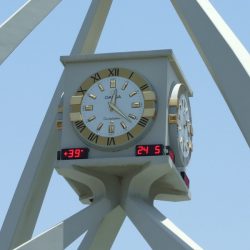
Opening hours
In Dubai stores have long opening times as people prefer to shop in the evening. Usually shops are open around 9 or 10 a.m. and close around 9 or 10 p.m. Although outside of Dubai it’s common to close shop for a break between 1 p.m. and 4 p.m. as that’s the warmest part of the day. Popular grocery shops are often open 24/7.
Shops are closed on friday morning for the friday prayer. The Islamic weekend falls on friday and saturday, but most shops stay open during the weekend. After all, Dubai is shopping heaven.
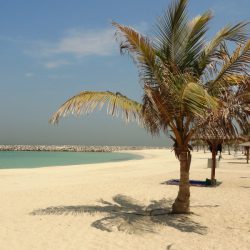
Weather and climate
Dubai is a warm country with a tropical desert climate. Especially juli and august are hot as the temperatures can be between 30 and 40 degrees celsius (86 to 104ºF). The temperatures in april and november are at a comfortable 25 degrees (77ºF) on average.
The winter months from december to february tend to be the coldest as it’s 20 degrees (68ºF) on average. So throughout the entire year the temperature is quite reasonably warm.
The sea tends to be warmer than 20 degrees celsius (68ºF) in the winter from december to february, but it warms up in april to a comfortable 25 degrees (77ºF). And on average over 30 (86ºF) degrees in the summer from june to oktober. The sea stays warm up until november when the water is 27 degrees (80ºF) on average. So the sea is throughout the year at relatively comfortable temperature.
In Dubai most rain tends to fall in february, but it’s sunny almost the entire year round.
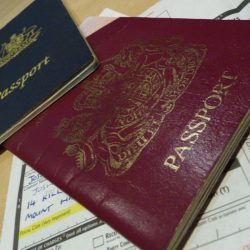
Passport and visa
As this is an international website and VISA requirements may be subject to change it is recommended to look on the website of the United Arab Emirates embassy or consulate to see if you need a tourist VISA before you visit Dubai.
If you are from one of the following European countries you can get a free 90 day tourist VISA stamp in your passport after you arrive in Dubai. Which means you do not have to make arrangements for a VISA before your flight.
“Austria, Belgium, Bulgaria, Croatia, Cyprus, Czech Republic, Denmark, Estonia, Finland, France, Germany, Greece, Hungary, Iceland, Italy, Latvia, Liechtenstein, Lithuania, Luxembourg, Malta, Netherlands, Norway, Poland, Portugal, Romania, Seychelles, Slovakia, Slovenia, Spain, Sweden, Switzerland”
If you are from one of the following countries you get a free 30 day tourist VISA stamp in your passport after you arrive in Dubai. Which also means you do not have to make arrangements for a VISA before your flight.
“Andorra, Australia, Brunei, Hong Kong, Ireland, Japan, Malaysia, Monaco, New Zealand, San Marino, Singapore, South Korea, United Kingdom, United States of America, Vatican City.”
People from other countries, except for Saudi Arabia and other neighbouring countries, will have to apply for a VISA before they leave. This can be done online at emirates.com and will require a sponsor like a hotel or travel agency from Dubai.
It’s worth noting all passports need to be valid for another 6 months after arrival. Children also need their own passport.

Language spoken
English is widely spoken in Dubai, due to the high number of expats living in the city, the lush tourist industry and as it is taught in schools. So tourists will have no problem getting around with English. But the official language of Dubai is Arabic.
Other minority languages you might come across due to foreign expats are hindi, punjabi and more.

Tipping culture in Dubai
In Dubai a service charge is calculated into the price in hotels and restaurants, which goes to all employees in that establishment. So a small tip for a specific person is appreciated, but not necessary per se. If you appreciate the services in a restaurant you could opt to tip the waiter 10% of the bill.
Rounding up the bill for taxi services and delivery people is expected and a nice gesture. Dubai is known for people going the extra mile to provide extra services for you, so 5 dirham to show your appreciation is always good.
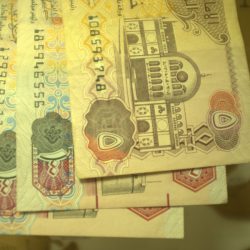
Paying in and the currency of Dubai
The Dirham is the official currency of Dubai. In shops the Dirham is often referred to as AED, Dhs and Dh. One Dirham consists of 100 Fils.
The exchange rate of the United Arab Emirates Dirham and the American Dollar are fixed to each other. If you own dollars the exchange rate does not fluctuate. On 25 June 2016 the current fixed exchange is 1 USD = 3.67315 AED and 1 AED = 0.272246 USD. If you try to exchange other currency, like the euro, then the exchange rate does fluctuate, as you have to take the euro to dollar exchange rate into account.
You can exchange money at banks, airports, hotels and exchange offices in the city. They can each calculate their own exchange rate. Exchange centers found in the city of Dubai tend to offer more competitive rates than the alternatives. There are also ATM’s across the city where you can just withdraw money.
Credit cards are well accepted throughout Dubai. So you can easily pay with your Mastercard and Visa card.
The prices of goods in Dubai tend to be comparable to those in the west. Some services, like taxis, tend to be cheaper. And in a lot of small market places you can also negotiate the prices of goods, although this is less common in shopping malls.
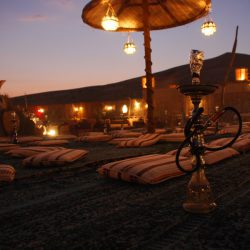
Culture and values
Dubai is quite multicultural. Culturally it is the most western region in the gulf. As such Dubai has become a very popular tourist destination. And as the native people get outnumbered by expats they are very used to people from different cultures.
Dubai is an Islamic city. The native Muslims respect the religion and customs of others. This goes both ways as non-Muslims are also expected to be respectful towards Muslim customs. The difference between cultures is often a matter of nuances. So we made a short list of nuances between western and dubaian culture relevant for travelers.
When you go to a church in Italy you are expected to cover your shoulders and knees, as a sign of modesty. In Dubai modest clothing is also expected, even in many shopping malls. Wearing bikini’s and swimwear is restricted to beaches and pools.
In Dubai you should not take pictures of random people, but respect their privacy. The same goes for taking pictures of buildings of strategic importance.
In the west we have laws against public intoxication. In Dubai drinking alcohol should not be done in public, but be reserved to private places like your hotel.
If you travel with medicine, especially painkillers, you should look into the legality of those medicine in Dubai. As drug laws in Dubai can be quite strict.
When you are traveling with your partner it is recommended to refer to each other as husband and wife, because in Dubai couples are expected to get married before they get together. Dubai hotels know non-Muslims have different customs regarding relationships so being just partners is usually no big deal, but it’s better to prevent the subject from coming up.
Following these tips you’ll be ready for a great vacation.
